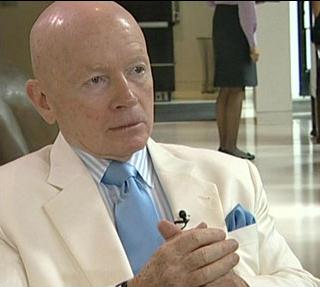Mark Mobius Targets Infrastructure as Nigeria Sells Stakes
Mark Mobius is targeting Nigeria’s roads, bridges and electricity generation as the government of Africa’s most-populous nation brings in private investors to help develop the country’s infrastructure.
Mobius, who oversees about $34 billion in emerging-market assets as executive chairman of Templeton Asset Management Ltd.’s Emerging Markets Group, has $180 million invested in Nigeria and is looking opening an office in Lagos, he said in an interview on CNBC Africa in Lagos today.
Nigeria’s government plans to sell 70 percent stakes in 11 power-distribution companies as part of a program to end its monopoly over the country’s electricity industry, the Bureau of Public Enterprises said on Sept. 20.
“They have power shortages here in the capital,” Mobius said. “You see the demand is tremendous. It’s a sign of growth; it’s a sign of demand and that means tremendous opportunity.”
Templeton Frontier Markets Fund has investments in Nigerian banks including First Bank of Nigeria Plc and Zenith Bank Plc, according to data compiled by Bloomberg. Mobius sees more opportunity in the sector as it continues to consolidate, he said today in the CNBC interview.
Central Bank of Nigeria Governor Lamido Sanusi in 2009 fired the chief executive officers of eight of the nation’s lenders, pumped the equivalent of $4 billion into ailing institutions and set up an entity to buy bad debts. Sanusi, 50, has reduced the number of banks from as many as 89 in 2005 as he started a clean-up of the industry.
Nigeria’s 10 largest banks trade at an average price-to- book ratio of 0.95, down from 1.31 as of December 2010.
“The opportunity is bigger than most markets because of valuations,” Mobius said.
Frontier markets including Nigeria were not as affected by the debt crisis in the U.S. and Europe because of strong domestic consumption, Mobius said.
South African companies expanding into the continent will also be considered for further investment, Mobius said. These include Johannesburg-based MTN Group Ltd., Africa’s largest mobile-phone operator, which earns 44 percent of its revenue from West and Central Africa, including Nigeria.
“We were disappointed by South African companies that were not willing to go north, but now they are changing,” Mobius said. “We will be looking at companies like MTN.”
BUSINESSWEEK





